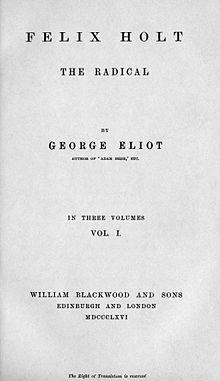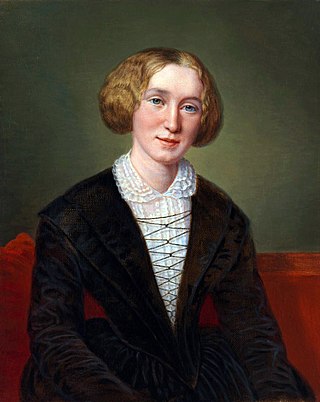
Mary Ann Evans, known by her pen name George Eliot, was an English novelist, poet, journalist, translator, and one of the leading writers of the Victorian era. She wrote seven novels: Adam Bede (1859), The Mill on the Floss (1860), Silas Marner (1861), Romola (1862–1863), Felix Holt, the Radical (1866), Middlemarch (1871–1872) and Daniel Deronda (1876). As with Charles Dickens and Thomas Hardy, she emerged from provincial England; most of her works are set there. Her works are known for their realism, psychological insight, sense of place and detailed depiction of the countryside. Middlemarch was described by the novelist Virginia Woolf as "one of the few English novels written for grown-up people" and by Martin Amis and Julian Barnes as the greatest novel in the English language.

Middlemarch, A Study of Provincial Life is a novel by English author George Eliot, the pen name of Mary Ann Evans. It appeared in eight installments (volumes) in 1871 and 1872. Set in Middlemarch, a fictional English Midlands town, in 1829 to 1832, it follows distinct, intersecting stories with many characters. Issues include the status of women, the nature of marriage, idealism, self-interest, religion, hypocrisy, political reform, and education. Despite comic elements, Middlemarch uses realism to encompass historical events: the 1832 Reform Act, early railways, and the accession of King William IV. It looks at medicine of the time and reactionary views in a settled community facing unwelcome change. Eliot began writing the two pieces that formed the novel in 1869–1870 and completed it in 1871. Initial reviews were mixed, but it is now seen widely as her best work and one of the great English novels.
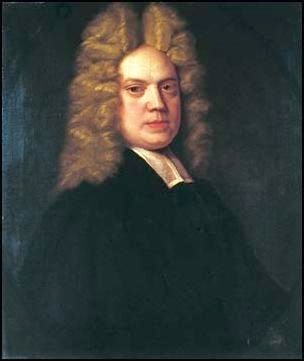
Henry Sacheverell was an English high church Anglican clergyman who achieved nationwide fame in 1709 after preaching an incendiary 5 November sermon. He was subsequently impeached by the House of Commons and though he was found guilty, his light punishment was seen as a vindication and he became a popular figure in the country, contributing to the Tories' landslide victory at the general election of 1710.
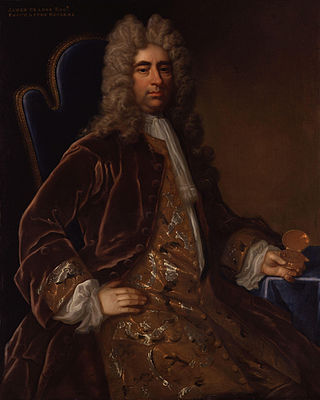
James Craggs the Elder, of Jermyn Street, Westminster and Charlton, Lewisham, Kent, was an English financier and Whig politician who sat in the English and British House of Commons from 1702 to 1713.

William Greenleaf Eliot was an American educator, Unitarian minister, and civic leader in Missouri. He is most notable for founding Washington University in St. Louis, and also contributed to the founding of numerous other civic institutions, such as the Saint Louis Art Museum, public school system, and charitable institutions. The modernist poet T. S. Eliot was his grandson.
Viola Meynell, Mrs. Dallyn was an English writer, novelist and poet. She wrote around 20 books, but was best known for her short stories and novels.
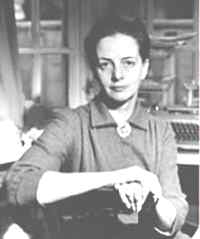
Marghanita Laski was an English journalist, radio panellist and novelist. She also wrote literary biography, plays and short stories, and contributed about 250,000 additions to the Oxford English Dictionary.
Loamshire Regiment is a placeholder name used by the British Army to provide examples for its procedures. For example, the Loamshire Regiment is provided by the British Forces Post Office to show how to write a British Army address, and is used to set out specimen charges for violations of military law. It is used in Hesketh Hesketh-Prichard's Sniping in France, a World War One manual for training British Army sharpshooters.
Using violence towards his superior officer contrary to section 33(1)(a) of the Army Act 1955 in that he at- on- [struck] [punched] [kicked] No 12345678 Sergeant J Brown, The Loamshire Regiment.

Trio is a 1950 British anthology film based on three short stories by W. Somerset Maugham: "The Verger", "Mr Know-All" and "Sanatorium". Ken Annakin directed "The Verger" and "Mr Know-All", while Harold French was responsible for "Sanatorium".

Scenes of Clerical Life is George Eliot's first published work of fiction, a collection of three short stories, published in book form; it was the first of her works to be released under her famous pseudonym. The stories were first published in Blackwood's Magazine over the course of the year 1857, initially anonymously, before being released as a two-volume set by Blackwood and Sons in January 1858. The three stories are set during the last twenty years of the eighteenth century and the first half of the nineteenth century over a fifty-year period. The stories take place in and around the fictional town of Milby in the English Midlands. Each of the Scenes concerns a different Anglican clergyman, but is not necessarily centred upon him. Eliot examines, among other things, the effects of religious reform and the tension between the Established and the Dissenting Churches on the clergymen and their congregations, and draws attention to various social issues, such as poverty, alcoholism and domestic violence.

Sir George Treby JP (1643–1700), of Plympton, Devon, and of Fleet Street in the City of London, was Lord Chief Justice of the Common Pleas and six times Member of Parliament for the Rotten Borough of Plympton Erle, Devon, largely controlled by him and his descendants until abolished by the Great Reform Act of 1832.
The Hypocrites is a 1923 British-Dutch silent drama film directed by Charles Giblyn, based on The Hypocrites, a 1906 play by Henry Arthur Jones. The plot concerns the hypocrisy of a squire who tries to make his son deny he fathered a village girl's child, and instead marry an heiress. Jones' play which had already been filmed as The Morals of Weybury (1916) directed by George Loane Tucker with Elisabeth Risdon. The writing credit for this movie goes to Henry Arthur Jones (play) and Eliot Stannard (writer).
Samuel MacCurdy Greer (1810–1880), was an Irish politician who, in Ulster championed Presbyterian representation and tenant rights. He was a founder member of the Ulster Tenant Right Association and of the all-Ireland Tenant Right League. In the general election of 1857 he was returned to Westminster on a tenant-right platform for County Londonderry.
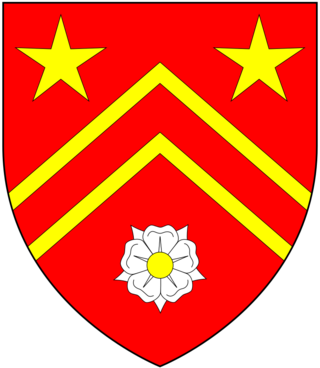
Rev. John Swete of Oxton House, Kenton in Devon, was a clergyman, landowner, artist, antiquary, historian and topographer and author of the Picturesque Sketches of Devon consisting of twenty illustrated journals of Devon scenery. He was a connoisseur of landscape gardening, and much of his Travel Journals consist of his commentary of the success or otherwise of the landscaping ventures of his gentry friends, neighbours and acquaintances in Devon. He himself undertook major building and landscaping works at Oxton.

George Treby of Plympton House, Plympton St Maurice, Devon, was an English Whig politician who sat in the House of Commons for 34 years from 1708 to 1742. He was Secretary at War from 1718 to 1724, and Master of the Household from 1730 to 1741. He built Plympton House between 1715 and 1720, which his father began and left unfinished at his death in 1700.

Plympton House is the principal residence at the Plympton House Estate, in the parish of Plympton St Maurice, Devon, England. It is a Grade I listed country house, in the William and Mary tradition, near St Maurice's Church in Plympton, commenced by Sir George Treby (1643–1700) and completed c. 1715 – 1720 by his son George Treby. The architect is unknown although accounts in 1720 refer to William Veale, mason. Its kitchen garden wall, southern boundary walls and gate piers and walls are Grade II listed.
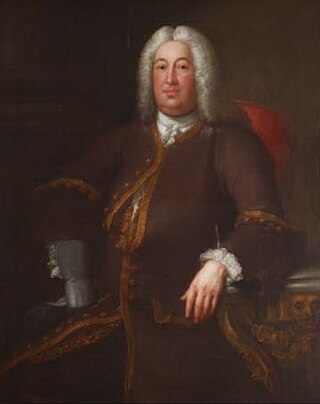
Sir Robert Davers, 2nd Baronet, of Rougham and Rushbrooke Hall, was an English Tory politician, landowner and slavetrader.

William Blackwood and Sons was a Scottish publishing house and printer founded by William Blackwood in 1804. It played a key role in literary history, publishing many important authors, for example John Buchan, George Tomkyns Chesney, Joseph Conrad, George Eliot, E. M. Forster, John Galt, John Neal, Thomas De Quincey, Charles Reade, Margaret Oliphant, John Hanning Speke and Anthony Trollope, both in books and in the monthly Blackwood’s Magazine.

Sir Jermyn Davers, 4th Baronet, of Rougham and Rushbrooke, Suffolk, was an English landowner and Tory politician who sat in the House of Commons from 1722 to 1743.
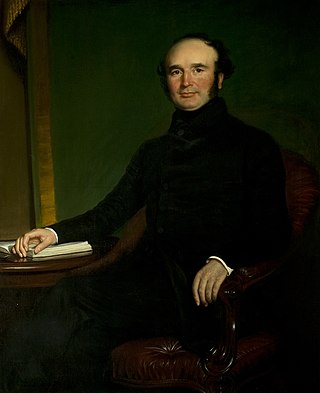
John Biggs was a British hosier and Liberal and Radical politician.
